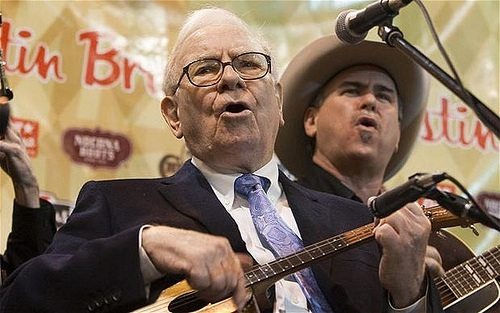
October 10, 2016; Washington Post
Is it possible that Donald J. Trump did not know about Warren Buffett’s history of tax advocacy when he declared during Sunday’s second presidential debate that Buffett, a Clinton supporter, took “massive deductions”?
Buffett has made plenty of noise about what he sees as the inequities of our system of taxation, once revealing that in 2010 he paid only 17 percent of his taxable income in federal taxes—lower than the 25 or 30 percent rate that more than twenty of his employees paid. Buffett wrote at the time:
While the poor and middle class fight for us in Afghanistan, and while most Americans struggle to make ends meet, we mega-rich continue to get our extraordinary tax breaks. Some of us are investment managers who earn billions from our daily labors but are allowed to classify our income as “carried interest,” thereby getting a bargain 15 percent tax rate. Others own stock index futures for ten minutes and have 60 percent of their gain taxed at 15 percent, as if they’d been long-term investors. These and other blessings are showered upon us by legislators in Washington who feel compelled to protect us, much as if we were spotted owls or some other endangered species. It’s nice to have friends in high places.
Sign up for our free newsletters
Subscribe to NPQ's newsletters to have our top stories delivered directly to your inbox.
By signing up, you agree to our privacy policy and terms of use, and to receive messages from NPQ and our partners.
This led to President Obama’s proposal for the “Buffett Rule,” based on the principle that no household making over $1 million annually should pay a smaller share of their income in taxes than middle-class families pay. Buffett, a philanthropist who, in contrast to Trump, gives away his own money and gave an amount equal to 75 percent of Trump’s entire estimated net worth last year alone, responded in a statement that he in fact does pay taxes, and he is more than willing to meet “any place, any time” to swap returns with the now-unshackled Donald.
“I have been audited by the IRS multiple times and am currently being audited,” Buffett wrote. “I have no problem in releasing my tax information while under audit. Neither would Mr. Trump—at least, he would have no legal problem.”
It’s certainly not a new thought, that before anyone goes around promoting themselves as a philanthropist, they should first pay their taxes. As a sector, we should be adamant about that. In 2010, NPQ published an article by Karen Kraut, Shannon Moriarty, and Kim Klein called “Talking About Taxes,” where they wrote:
A simple, easy-to-understand beginning frame also begins and ends with the common good. Peter Maurin, a teacher of Dorothy Day who also founded the Catholic Worker Movement, said that our job is to “create a society in which it is easy to be good.” Such a society has many elements, but it presumes a commitment to a rough social equity that is partly achieved by a progressive tax system. The nonprofit sector is key to insisting on this, or it will be the primary victim of its absence. It is our choice, and it must be made quickly.
—Ruth McCambridge













